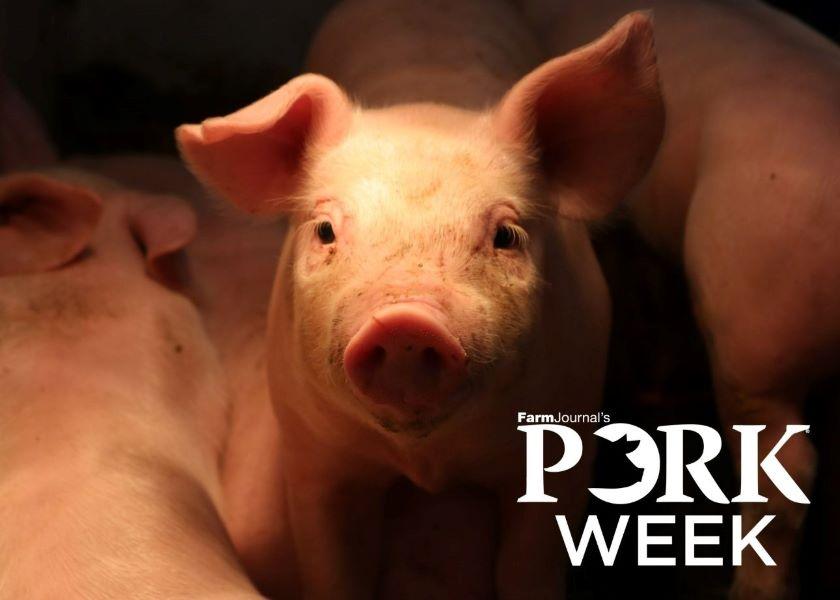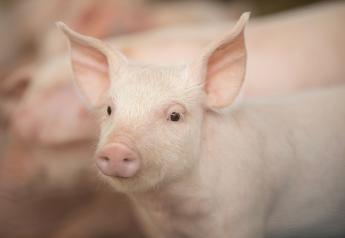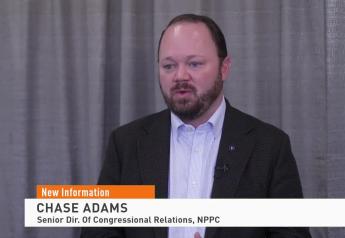Swine Veterinarian Weighs-In On PRRS, Biosecurity Efforts by Pork Industry

The 33rd World Pork Expo is underway for the first time since 2018, and event planners have worked diligently to make sure the event is as biosecure as possible.
On Wednesday, AgriTalk host Chip Flory asked swine veterinarian, Brandi Burton, DVM, Suidae Health and Production, Algona, Iowa, to rate the pork industry on its success and progress in addressing biosecurity concerns, disease issues and technology use. Here are four questions Burton addressed during the discussion.
What’s the status on porcine reproductive and respiratory syndrome (PRRS)?
“At least in the Midwest, where I practice, PRRS is really a struggle right now,” Burton reports. “There's a strain out there that just seems to break all biosecurity measures that we've put in place, and it's just making its way around. So we're doing our best to handle it, but this season right now is kind of atypical for the industry.”
What kind of an impact is PRRS having on the pig crop?
“The strains that are kind of more common right now that we're seeing don’t seem to affect sows a whole lot. They're surely getting sick. But what it is doing is really affecting that piglet quality. So those piglets while they're on mom, they're really struggling. And then when we take them off of mom, in that nursery phase, they're continuing to struggle. So, we're seeing some higher mortality than normal. When I've seen this strain I haven't seen the super severe cases that others have, but I still see some loss.”
How are we doing with biosecurity in the effort to keep out foreign animal diseases?
There's a lot of effort that's been underway. I've been quite involved with a lot of the things that are (in the works) at the state level and with our producers, and it's definitely catching everyone's attention. We're really training producers and caretakers to think of biosecurity as a mindset and create that habit of biosecurity. It's going to take time, and it's work. But once they buy into that mindset, they are getting a lot better at implementing the steps that we're asking them to take. I think as a whole we're moving in the right direction. It's just going to take a little bit of time.”
How is technology helping you work with pork producers to identify health issues and care for animals better?
Burton told Flory that LeeO, an individual animal tracking system designed for paperless data collection in real time in the commercial pork supply chain, has been particularly useful.
LeeO uses radio frequency identification tags (RFID), an application that can be used on mobile devices, to basically store information on an individual animal basis.
“We can track any type of information that you want on each of the pigs that have these tags,” she says. “We've used it on a farrow-to-finish, 2,500-head sow farm. Currently, we've had over 100,000 individual animals tracked using the system.”
Developed by Prairie Systems, LeeO can inform decision making, track individual pig data, reduce labor pressures and help streamline vaccination and treatment protocols.
Such technology helps Burton look at populations of pigs and also focus on individual pig care and how to improve it.
“With these technologies, we can import notes, we can have communication between caretakers and those outside of the farm – a lot more direct conversations and trackable information,” she told Flory.
Burton says the technology even enables users to scan pigs and determine which ones should go to market first. “You can get some really detailed information in the finishing barn,” she adds.
Listen here to the conversation on AgriTalk:
Is This Year’s PRRS Better or Worse?
Moving Forward from the Pandemic: 5 Pig Farmers Share What Keeps Them Going
Farm Journal Live: World Pork Expo is Back!
Celebrate #PORKWeek with Farm Journal’s PORK







